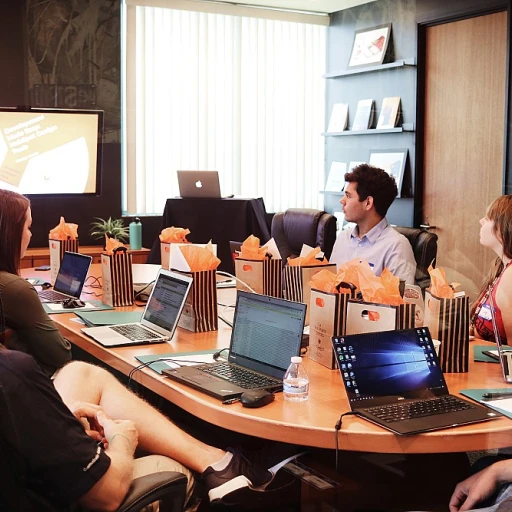
Understanding the Importance of Learner Experience
Emphasizing Learner-Centric Approaches in Reskilling
Understanding the importance of the learner experience is crucial in today's fast-evolving business climate. With the accelerating pace of change in the digital landscape, organizations are shifting their focus to reskilling employees to close the skills gap. This shift not only addresses organizational needs but also enhances employee satisfaction and productivity. The learner experience (LX) is about creating a seamless and engaging journey for employees. It’s about blending content and delivery through learning management systems (LMS) to maintain relevance and engagement. Learners should feel this flow of work-based learning aligns with their professional growth, considering every aspect of corporate learning, from micro-learning modules to more extended training periods. To create a robust employee experience in reskilling, companies must invest both time and resources in developing holistic learning platforms. Utilizing learning experience platforms (LXP) and enterprise learning technologies allows businesses to cater to individual learning preferences. By making learning and development (L&D) a continuous process, companies can ensure that their workforce remains adaptable and competitive. Moreover, leveraging the expertise of industry leaders and utilizing insights from resources like Josh Bersin’s work in enterprise learning can significantly enhance the design of these systems. There is growing recognition that a well-executed learning experience design can foster greater employee engagement and contribute significantly to a company's success in the market. To learn more about how enterprise training models are evolving to improve learner experiences and overall skill acquisition, consider exploring the path to reskilling through innovative training methods.Bersin's Approach to Learner Experience
Creating a Seamless Flow in Work
In the rapidly evolving landscape of corporate learning, it's essential to provide a seamless learning experience for employees. Bersin emphasizes the importance of integrating learning into the flow of work. This approach ensures that learning doesn't happen in isolation but is part of everyday business activities, ultimately enhancing the overall learner experience.
Designing Learning Experience Platforms (LXP)
Leveraging a sophisticated learning experience platform (LXP) can significantly enhance the learning journey. These platforms are designed to deliver personalized, engaging, and interactive learning experiences. By harnessing the capabilities of digital learning tools, enterprises can ensure that content is relevant and instantly accessible. This not only boosts employee engagement but also improves knowledge retention.
Personalized Content for Diverse Learning Needs
One of the hallmarks of Bersin's strategy is content personalization. Recognizing that employees have diverse learning styles, Bersin's approach involves tailoring c The integration of learning management systems (LMS) plays a crucial role in delivering a cohesive learning experience. These systems support various types of learning, from microlearning to more in-depth courses, making it easier for employees to acquire the skills they need when they need them. For detailed insights on effectively mastering skills through timely training, consider this resource. By aligning learning strategies with Bersin's insights, organizations can ensure that their learning and development (L&D) efforts are not only effective but also efficient, ultimately benefiting both employees and the wider business. The digital evolution has paved the way for technological advancements, profoundly impacting the landscape of corporate learning and development. Businesses now have the opportunity to utilize cutting-edge tools to augment employee training, fostering an enhanced learning experience that better meets the needs of a dynamic workforce. Adopting learning management systems (LMS) and learning experience platforms (LXP) has become crucial in this regard. These platforms not only facilitate seamless management of training content but also personalize the learning journey by tailoring modules to the unique demands and preferences of users. This allows employees to access effective resources in their flow of work, thereby promoting a more engaging and productive learning environment. A holistic approach to digital learning also integrates micro learning techniques that break down complex information into digestible segments. This form of business training offers flexibility, enabling employees to absorb knowledge at their convenience and pace, ultimately improving their skills and enhancing overall productivity. Moreover, advanced technologies such as artificial intelligence (AI) and machine learning play a significant role in optimizing the learning experience. These innovations provide invaluable insights into a learner's progress, helping organizations identify skill gaps and personalize content that suits individual learning styles. By leveraging AI-driven systems, companies can anticipate market needs and stay ahead in developing the necessary employee capabilities. The integration of technology in corporate training must be underpinned by meticulous experience design. Organizations need to focus on creating intuitive user interfaces that encourage engagement and foster a sense of community among learners. This focus on design, coupled with technology, ensures that employees are not only developing new skills but doing so in a way that is aligned with their career aspirations and the strategic goals of the business. In summary, harnessing advanced technology is paramount for organizations aiming to enhance their reskilling initiatives. By effectively implementing these digital solutions, companies can ensure both a comprehensive and gratifying learning journey for their employees, setting the stage for a more adept and agile workforce. In the rapidly evolving landscape of corporate learning, several organizations have successfully implemented reskilling initiatives that not only enhance the learner experience but also align with business objectives. These case studies highlight the effective use of learning management systems (LMS) and learning experience platforms (LXP) to foster skill development and employee engagement. A leading tech company recognized the need to reskill its workforce to keep pace with technological advancements. By leveraging a robust LXP, they designed a digital learning ecosystem that facilitated micro learning and on-demand content. This approach allowed employees to learn at their own pace, integrating seamlessly into the flow of work. The result was a significant improvement in employee satisfaction and productivity, demonstrating the power of well-designed learning platforms. In the retail industry, a major player faced challenges with high employee turnover and the need for consistent training across locations. By implementing a comprehensive LMS, they standardized training content and utilized experience design principles to create engaging learning experiences. This system not only improved skill retention but also reduced training time, allowing employees to spend more time on the sales floor, directly impacting the bottom line. A financial services firm embarked on a reskilling journey to address the evolving market demands. They adopted an enterprise learning strategy that combined traditional training with digital platforms. By integrating an LXP into their learning development framework, they provided employees with access to a wide range of resources, fostering a culture of continuous learning. This initiative not only enhanced employee skills but also positioned the company as a leader in the competitive market. These case studies underscore the importance of strategic planning and the use of advanced learning systems in reskilling efforts. By focusing on the learner experience and utilizing platforms like those discussed by Bersin, organizations can effectively navigate the challenges of reskilling and drive business success.Integrated Learning Management Systems (LMS)
Challenges in Reskilling and How to Overcome Them
Addressing the Roadblocks Along the Path to Reskilling
Reskilling presents a unique set of challenges that corporations and learning and development (L&D) departments must aim to navigate effectively. From technological barriers to employee reluctance, each challenge requires a strategic approach to ensure successful learning and development initiatives.
First, it's crucial to acknowledge the pivotal role of technology in today's reskilling landscape. While digital learning platforms and systems such as LMS and LXP are designed to deliver seamless, blended learning experiences, some enterprises face issues with integrating these systems into their existing workflow. Ensuring smooth integration without disrupting the flow of work is key to maximizing the benefits of these platforms.
Another common challenge is content relevancy and alignment with current job roles. Human Resources and L&D teams must work closely with content providers to ensure learning content is not only up-to-date but also tailored to meet specific business needs and market demands. This often requires collaborative effort across management and design teams to ensure that the learning experience design aligns with enterprise learning objectives.
Employee participation in reskilling programs can also pose a problem. Despite offering robust corporate training programs, employees might resist participating due to lack of time, perceived irrelevance of the training, or a simple lack of motivation. Leveraging experience platforms and innovative solutions such as micro-learning can help engage employees by providing more personalized, on-demand learning paths.
Lastly, addressing the fast-paced evolution of necessary skills is vital. Businesses must anticipate and prepare for future skill requirements to stay competitive. Establishing a proactive approach to learning development and continuous improvement can aid in this endeavor.
For more insights on overcoming these challenges and enhancing the learner experience in reskilling efforts, explore this insightful reskilling journey at DevLearn.Leveraging Technology for Improved Learner Experience
Harnessing Technology to Elevate Learning Experiences
Case Studies: Successful Reskilling Initiatives
Real-World Examples of Reskilling Success
Transforming Employee Skills in the Tech Industry
Retail Sector Embraces Digital Learning
Financial Services: A Shift to Continuous Learning
Future Trends in Reskilling and Learner Experience
Glimpsing into the Future of Reskilling
The evolution of reskilling is inextricably linked to the broader shifts in the workplace and the growing demands of the modern business landscape. As we look towards the future, it's evident that the way employees learn and develop their skills will continue to undergo significant changes. With platforms like Learning Experience Platforms (LXPs) and Learning Management Systems (LMS) already making waves, what's next for the future of reskilling?
Firstly, the continued growth of digital learning and micro learning is set to redefine how skill acquisition and training are approached. As organizations adopt more comprehensive digital learning strategies, employees benefit from flexible, on-demand learning experiences tailored to their roles and work flow. This transformation in corporate training environments facilitates a deeper and more personalized learning experience.
Moreover, the integration of artificial intelligence in learning platforms is poised to enhance the learning flow and content delivery. AI-powered systems promise to offer adaptive learning paths, automating parts of the design process to ensure efficiency and relevance. This helps management systems and L&D teams to provide more strategic and data-driven employee development solutions.
In addition, the concept of experience design will take center stage, emphasizing user-centric learning approaches. Experience platforms are increasingly focused on engaging employees in a manner that aligns with their specific needs and work contexts. Subsequently, the emphasis on creating seamless learning experiences within the employee’s flow of work will intensify, as outlined by Bersin's insights on learner experience optimization.
The gradual shift towards enterprise learning ecosystems means leveraging different platforms to meet diverse learning needs. Learning development is expected to embrace ecosystem-based strategies, blending technologies and methodologies to support varied learning channels, from instructor-led training to autonomous online modules.
Finally, as research and market trends indicate, the reskilling initiatives of today set the stage for tomorrow's workforce challenges. As businesses continue to prioritize adaptability, skill flexibility, and continuous learning for their employees, investing time and resources in forward-thinking reskilling solutions will remain essential. Companies that engage with these future trends are more likely to retain talent and maintain competitive advantage. Thus, the future of reskilling holds immense potential for enhancing the overall learner experience and preparing employees to meet the ever-evolving demands of the job market.













